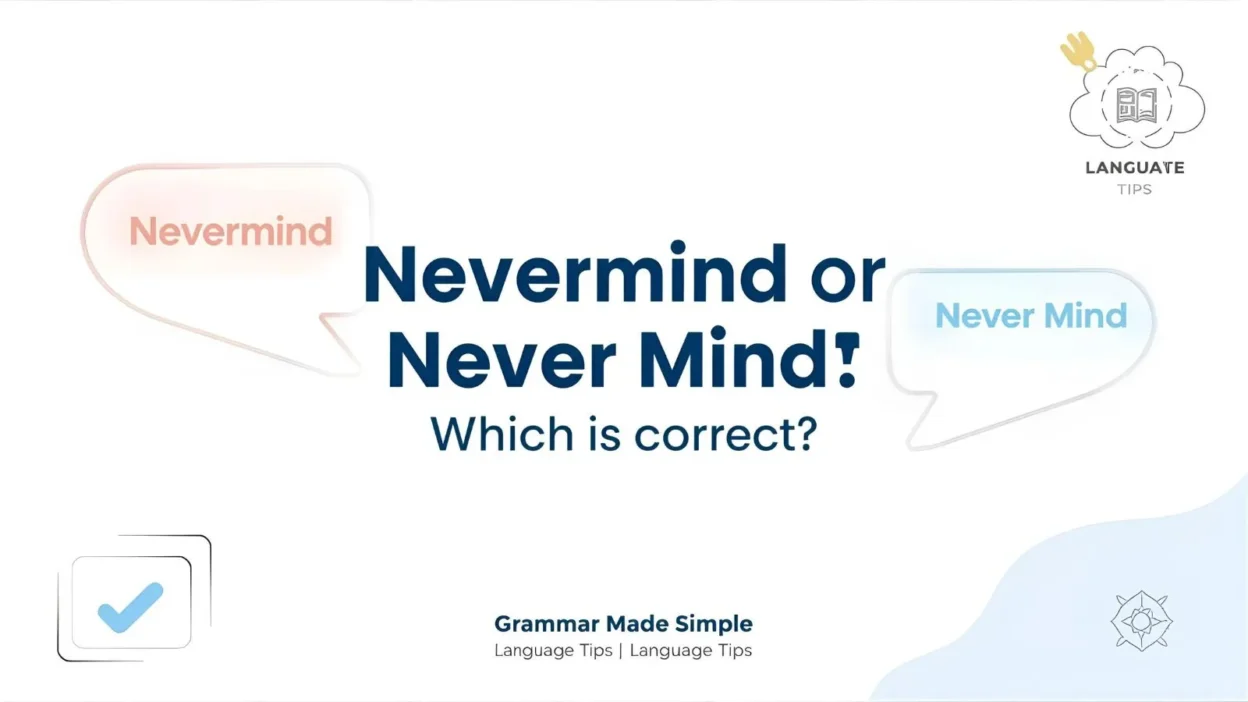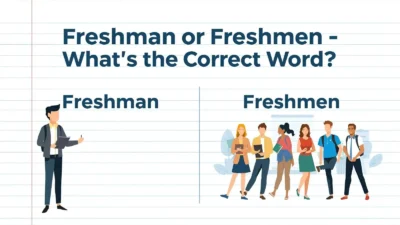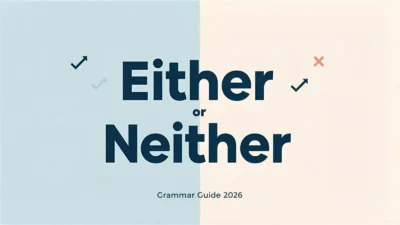Have you ever typed “nevermind” and wondered if it should be “never mind” instead? You’re not the only one! Many students, writers, and professionals get confused by this tiny phrase.
It looks simple but can change meaning depending on how you use it. If you care about writing clearly and correctly, this guide is for you.
I’ll quickly explain what’s right, what’s wrong, and how to remember the difference — so you never mix up “nevermind or never mind” again.
Nevermind or Never Mind – Quick Answer ✅
The correct phrase is “never mind” (two words). It’s used to tell someone to ignore something or not worry about it.
Examples:
- Never mind, I found the keys.
- Oh, never mind what I said earlier.
The one-word version “nevermind” is considered informal or nonstandard in modern English, though it appears in song titles (like Nirvana’s Nevermind) or casual online messages.
👉 In writing: Always use “never mind.”
The Origin of Nevermind or Never Mind 📜
The phrase “never mind” dates back to the late 1700s, meaning “do not pay attention to” or “don’t concern yourself.” It comes from the combination of never (not ever) and mind (care or concern).
Over time, people began pronouncing it quickly, making it sound like a single word — which eventually led to the informal “nevermind.”
The one-word version gained visibility in pop culture (especially after Nirvana’s 1991 album), but linguistically, the two-word form remains the grammatically correct version.
British English vs American English Spelling 🇬🇧🇺🇸
Both British and American English officially prefer “never mind.” However, in American informal writing (texts, social media), “nevermind” sometimes appears as slang.
| Usage Context | British English | American English | Notes |
|---|---|---|---|
| Formal writing | ✅ Never mind | ✅ Never mind | Correct in both |
| Informal speech | ✅ Never mind | ✅ Never mind / ❌ Nevermind | “Nevermind” used casually in U.S. |
| Music/Literature | ✅ Never Mind | ✅ Nevermind | Artistic choice |
| Professional emails | ✅ Never mind | ✅ Never mind | Always two words |
So, while “nevermind” might pop up in casual chats or pop culture, “never mind” is the universally accepted form in both English variants.
Which Spelling Should You Use? 🧠
If you’re writing for:
- Professional or academic audiences → Use “never mind.”
- Casual texting or creative writing → “Nevermind” may be acceptable, but only if you’re being intentionally informal.
- Global audience → Stick with “never mind” to ensure clarity and correctness everywhere.
👉 Rule of thumb: If you could publish it or send it to your boss, always write “never mind.”
Common Mistakes with Nevermind or Never Mind ⚠️
Here are frequent mix-ups people make:
| Mistake | Correct Form | Explanation |
|---|---|---|
| Nevermind, I don’t care. | ✅ Never mind, I don’t care. | “Never mind” means “don’t worry.” |
| Oh, nevermind about that! | ✅ Oh, never mind about that! | Two words are correct. |
| It’s okay, nevermind. | ✅ It’s okay, never mind. | Use “never mind” in speech or writing. |
🔸 Remember: “Nevermind” is not recognized as a standard English word in formal contexts.
Nevermind or Never Mind in Everyday Examples 💬
Let’s see how it appears in real-life writing:
In emails:
Never mind, I found the document I was looking for.
On social media:“
Ugh, nevermind. I’ll just order pizza instead .
In news articles:
The spokesperson said, ‘Never mind the rumors — the decision has not been finalized.
In formal writing:
Never mind the setbacks; success is often born from failure.
Notice how “never mind” fits seamlessly in both casual and serious contexts.
Nevermind or Never Mind – Google Trends & Usage Data 📈
According to Google Trends, the phrase “never mind” is searched and used far more frequently than “nevermind.”
| Term | Global Popularity | Common Regions |
|---|---|---|
| Never mind | ⭐⭐⭐⭐⭐ | U.S., U.K., Canada, India, Australia |
| Nevermind | ⭐⭐ | U.S. (pop culture, casual use) |
The term “nevermind” spikes occasionally due to music references, especially Nirvana’s iconic Nevermind album, but “never mind” dominates in daily communication and search data.
FAQs:
1. Which is grammatically correct – nevermind or never mind?
✅ Never mind is grammatically correct.
2. Is “nevermind” acceptable in texting?
Yes, informally. But avoid it in formal writing.
3. Why do people use “nevermind”?
Because in speech, “never mind” sounds like one word.
4. Did “nevermind” become popular because of Nirvana?
Yes! The band’s 1991 album Nevermind popularized the one-word form.
5. Can I write “nevermind” in an email?
No, use “never mind.” It’s more professional and correct.
6. Does “never mind” mean the same as “forget it”?
Exactly! Both mean “don’t worry about it.”
7. Is “nevermind” in the dictionary?
Yes, some dictionaries include it as an informal variant, but it’s still marked nonstandard.
🪶 Conclusion
When it comes to “nevermind or never mind,” the answer is simple — always use “never mind” in proper writing. The two-word version has stood the test of time and remains the grammatically correct choice across English dialects.
While “nevermind” may appear trendy or casual (thanks to pop culture), it’s still not standard English. So, whether you’re drafting an essay, writing to your boss, or posting on social media, remember: clarity and correctness matter.
Next time you type it, pause and choose wisely — your words say a lot about your writing style. 😉



